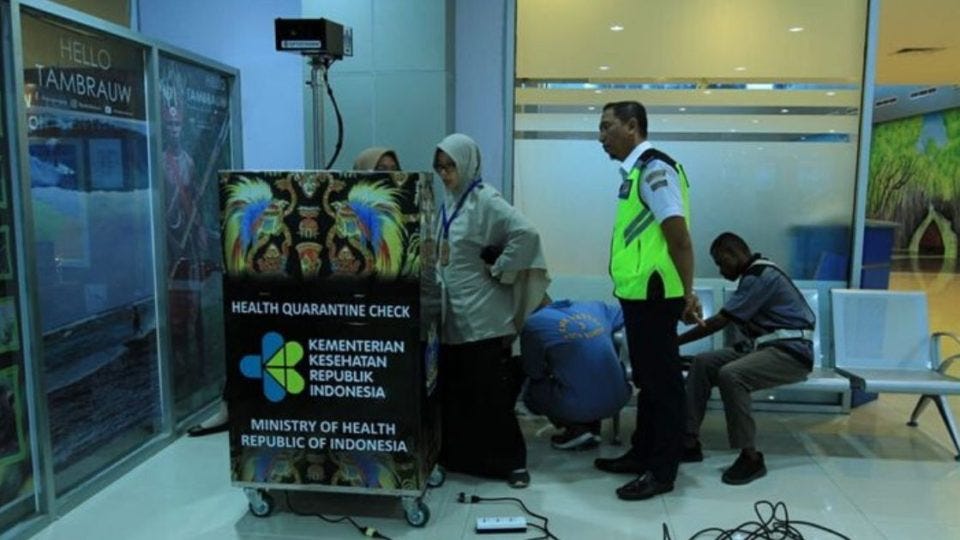The Lede: Coronavirus scramble is on
Hello Coconauts!
Today we’ve got the latest in Indonesia’s coronavirus coverage. For premium subscribers, check inboxes Friday for all you need to know about the impact of the crisis on the country’s economy and the business community. And keep up to date with us on Twitter, @IndoIntel.
Stay safe out there and we’ll see you Friday,
Erin Cook

Indonesia reported 107 new cases Tuesday afternoon in the biggest one day increase yet. The new cases bring the total to 686. Seven additional deaths have seen the overall death toll rise to 55, Health Ministry spokesman Achmad Yurianto said. Separately, the Health Ministry warned around 700,000 Indonesians are at risk of contracting the virus.
Indonesia currently has the world’s highest mortality rate of the virus at 9.3 percent. Globally, experts say the mortality rate should hover around 1 percent which raises the possibility that Indonesia has many, many unknown cases. Australia’s ABC reports that experts expect that rate to decline after the arrival of new test kits and a roll-out of wider spread testing.
Tens of thousands of Balinese have attended celebrations surrounding Nyepi, the island’s Day of Silence, despite warnings from the provincial government that mass gatherings are primed to spread the coronavirus. As of Tuesday, just 71 tests have been administered in Bali and typically still take around one week for results to be obtained after samples are flown to labs in Jakarta.
Vice President Ma’ruf Amin has called on Muslim clerics across the country to support mitigation efforts by postponing large gatherings. "Muslim clerics must obey the government's order. The Indonesian Ulema Council [MUI] has also issued a fatwa restricting religious gatherings. Muslim clerics should participate in guiding fellow Muslims to follow the government's calls," he said at a press conference on Monday.
The Immigration Directorate will grant visa extensions to foreigners who arrived in the country after February 5 but are now unable to return home. More than 2,000 foreigners in Bali are hoping to take the government up on its offer, with hundreds of Chinese nationals and dozens of Europeans applying for emergency visas since the crisis took hold last month.
Some Indonesians are taking the more traditional route to prevent and treat coronavirus. Villagers from Wajak Kidul in the Tulungagung district, East Java, have taken to hanging homemade masks around their homes to prevent the virus from spreading. "Every time we turn on the television, we watch news about the coronavirus. Everyone here talks about the virus every day," says 80-year-old Supani. He says he’s seen many pandemics in his time and the masks have done well to protect the village.
Recommended reads:
No work, no money: how self-isolation due to COVID-19 pandemic punishes the poor in Indonesia (The Conversation)
“Ohh so sad. No turis [tourists] no job,” posted one online driver on his social media just three days after the government declared COVID-19 a national disaster.
Online drivers are also prone to coronavirus infections as they meet many different people in the course of their work.
GOJEK, one of the largest online driver platforms in Indonesia, has suspended the account of one of its drivers who was suspected of having COVID-19. But how will the driver get his income?
A similar story involves a 36-year-old casual domestic worker and mother from Yogyakarta, about 500 kilometres from the capital Jakarta.
“I can’t afford to self-isolate. I need to go to work,” she said. “No work means no money, and no money means no food for my kids.”
Politics of pandemics: How online 'buzzers' infect Indonesia's democracy, jeopardize its citizens (The Jakarta Post)
But it appears that nothing is off limits for a group of local social media influencers who are willing to turn every issue into a petty partisan squabble, framing an extremely serious discussion about ways to prevent a looming health disaster within a shallow, myopic and nauseating political spectrum.
In the past few days, at a time when the central government is expected to act fast to respond to the pandemic, social media users have been engaged in a heated discussion over whether Indonesia, or Jakarta, should impose a partial lockdown to “flatten the curve” of infection in order to save lives.
Free discussion is certainly a necessity in a democracy and I cherish the fact that Indonesians are able to talk about how the government is handling this crisis on social media. But, alas, this discussion is only useful if there are no groups of people with vested interests trying to muddy the waters and turn a supposedly rigorous, evidence-based policymaking process into a mere political game.


